 Petzlover
Petzlover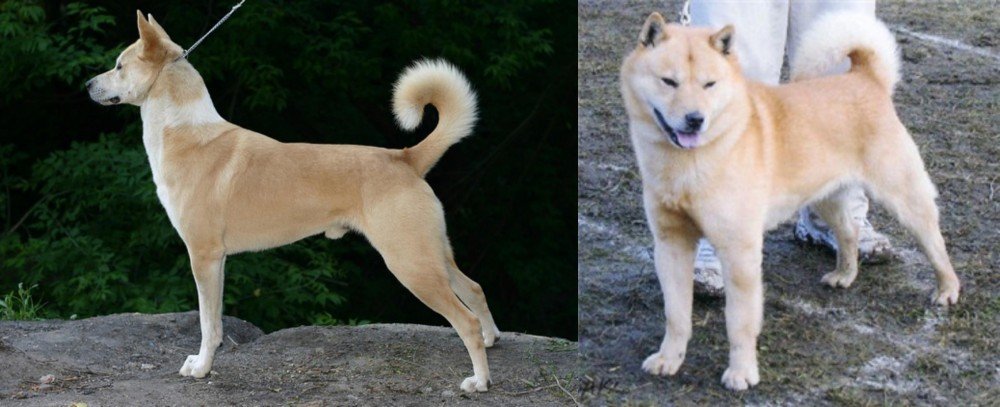 Canaan Dog is originated from Israel but Hokkaido is originated from Japan. Canaan Dog may grow 10 cm / 4 inches higher than Hokkaido. Canaan Dog may weigh 24 kg / 52 pounds lesser than Hokkaido. Both Canaan Dog and Hokkaido has same life span. Both Canaan Dog and Hokkaido has almost same litter size. Canaan Dog requires Low Maintenance. But Hokkaido requires Moderate Maintenance
Canaan Dog is originated from Israel but Hokkaido is originated from Japan. Canaan Dog may grow 10 cm / 4 inches higher than Hokkaido. Canaan Dog may weigh 24 kg / 52 pounds lesser than Hokkaido. Both Canaan Dog and Hokkaido has same life span. Both Canaan Dog and Hokkaido has almost same litter size. Canaan Dog requires Low Maintenance. But Hokkaido requires Moderate Maintenance
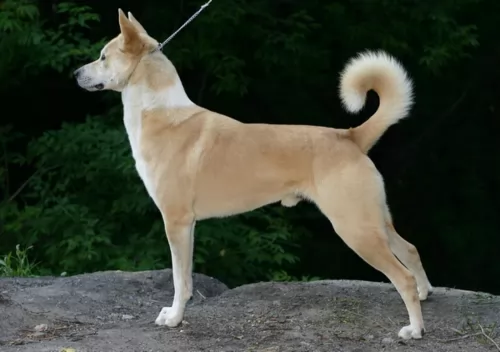 The Canaan Dog is an attractive dog and is Israel’s national breed. Research reveals that the dog’s history can be traced way back to 2200BC.
The Canaan Dog is an attractive dog and is Israel’s national breed. Research reveals that the dog’s history can be traced way back to 2200BC.
The dog’s origins go back to the pariah dog of the Middle East. It is believed that the dog has been perceived as a sacred animal and that he was both guard- and herd dog of the ancient Israelites.
A certain Dr Rudolphina Menzel moved from Vienna to Israel and was asked to establish a service dog organization. She trained and bred them, finding them to be highly trainable. She began a breeding program in 1934, providing working dogs for the military and starting a selective breeding program for the Canaan dog. The Israel Kennel Club dog recognized the Canaan for the first time in 1953.
 The Hokkaido breed originates in Japan and is also called Ainu-ken, Ainu dog, Seta or Do-ken. The last being its common name in Japan. It is believed that the Hokkaido is descendent from the Japanese Matagi-ken, meaning hunting dog, deer hunting dog or bear hunting dog. It was the Ainu peoples that brought the breed to Tohoku. Many years later the Yayoi people brought in another breed of hunting dogs. These breeds were in isolation for most of their existence and therefore they had little influence on the further development of other breeds.
The Hokkaido breed originates in Japan and is also called Ainu-ken, Ainu dog, Seta or Do-ken. The last being its common name in Japan. It is believed that the Hokkaido is descendent from the Japanese Matagi-ken, meaning hunting dog, deer hunting dog or bear hunting dog. It was the Ainu peoples that brought the breed to Tohoku. Many years later the Yayoi people brought in another breed of hunting dogs. These breeds were in isolation for most of their existence and therefore they had little influence on the further development of other breeds.
The Ainu dog was used in searches as well as hunting and became in 1937 “a rare species in Japan that is protected by law”. At that time the Official Name of the breed was set in place as Hokkaido-Inu. But they are still called Hokkaid0-Ken by most Japanese people.
This is a very rare breed of dog. It is hardly known outside of Japan and in country there are about ten to twelve thousand remaining. Of those about nine hundred to one thousand are registered in Japan every year. It is guessed that less than thirty exist outside Japan.
The Hokkaido breed is the oldest Japanese breed of dogs. Today they are great indoor companions, loyal and friendly. Most people in Japan still call them the Ainu dog.
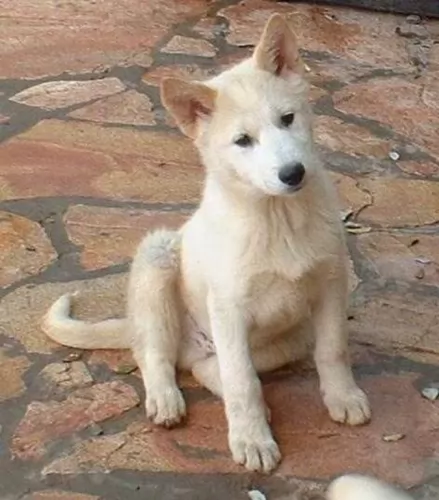 The Canaan Dog is lean, standing at between 51–61cm and weighing roughly 18-25kg. The medium sized Canaan Dog’s coat is medium length and can be sandy to brown, white or black or a mix of these. The eyes are dark and inquisitive, the ears are erect and the high set bushy tail is curled over the back.
The Canaan Dog is lean, standing at between 51–61cm and weighing roughly 18-25kg. The medium sized Canaan Dog’s coat is medium length and can be sandy to brown, white or black or a mix of these. The eyes are dark and inquisitive, the ears are erect and the high set bushy tail is curled over the back.
The Canaan Dog is alert, intelligent, confident and territorial. They are wary of strangers and because they’re alert they’re constantly aware of movement, making them a superb watchdog. However, the dog isn’t aggressive and he makes an excellent family pet, even around children and other pets.
He will need training and socialization though to make him obedient and amicable. He is a strong-willed dog. He is co-operative when being trained and responds well. They are energetic and will make a good companion for runners and cyclists.
 The Hokkaido breed is medium in size but very strong in build. Dogs bred outside Japan tend to be smaller. They have wide, deep chests, and long thick coats compared with Japanese dogs from other breeds. It is a double coat of long fur on top and short softer fur underneath for the second coat. Their ears are triangular and small while their eyes have a triangle outline. The double coat could be sesame, white, red, black, black and tan and wolf-gray.
The Hokkaido breed is medium in size but very strong in build. Dogs bred outside Japan tend to be smaller. They have wide, deep chests, and long thick coats compared with Japanese dogs from other breeds. It is a double coat of long fur on top and short softer fur underneath for the second coat. Their ears are triangular and small while their eyes have a triangle outline. The double coat could be sesame, white, red, black, black and tan and wolf-gray.
They are an intelligent breed with an impulsive gait. They are alert, courageous and suspicious. They were used for guarding the city gates. Their skull is flat and broad and the tongue, like the chow chow, is blueish. black. With a black nose and a wedge shaped muzzle, the Hokkaido is a handsome dog. His lips are with black and tight. High set, thick tail over the back or slightly curved to the side.
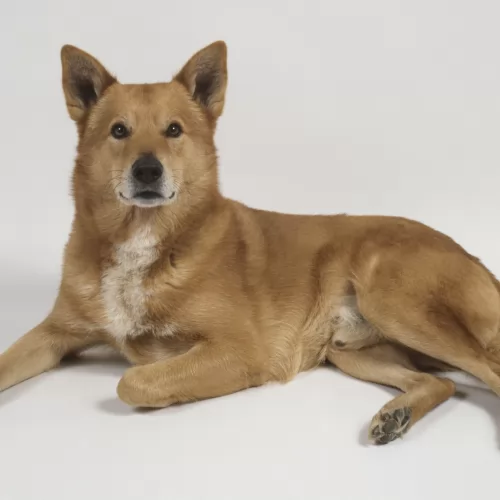 The Canaan Dog is an intelligent dog and this makes him easy to train. He is a strong-willed, independent dog and will require training and socialization to make him obedient. He is an affectionate and loving dog and will make a wonderful family pet.
The Canaan Dog is an intelligent dog and this makes him easy to train. He is a strong-willed, independent dog and will require training and socialization to make him obedient. He is an affectionate and loving dog and will make a wonderful family pet.
The Canaan Dog is also a fairly healthy, robust breed and appeals to many dog owners who don’t have to spend money on professional grooming for him. He doesn’t require much – isn’t high maintenance at all and he is just waiting to become a member of a human family where he can be loved and cared for just like any other family member.
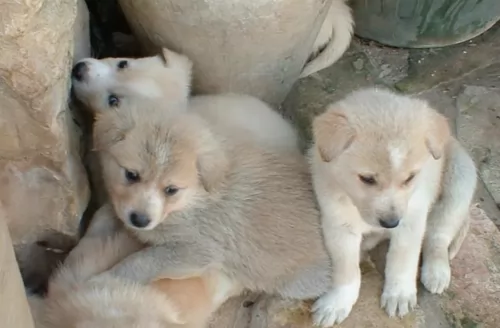 The Canaan Dog has a strong immune system and with good care from his owner he can reach 15 years of age. He has been used to living in harsh conditions in the deserts of Israel.
The Canaan Dog has a strong immune system and with good care from his owner he can reach 15 years of age. He has been used to living in harsh conditions in the deserts of Israel.
If you want to buy a Canaan dog, as with any dog, a good breeder will be able to produce health certificates for the puppy's parents. These certificates confirm that the dog has been tested and cleared of certain common conditions that affect dogs.
Because hip dysplasia is such a common problem with dogs, you may want to see health certificates from the Orthopedic Foundation for Animals (OCA).
A form of cancer that you might expect to see in this breed is Lymphosarcoma, a cancer which affects the lymphoid system. The lymphoid system is a critical part of the dog’s immune system to fight off viruses and bacteria.
 Often breeds that are isolated like the Hokkaido, have a pretty good health history but there are a few serious issues that they face.
Often breeds that are isolated like the Hokkaido, have a pretty good health history but there are a few serious issues that they face.
1/3 of all dogs have it while 2/3 are carriers. This disease is congenital and there is no cure. It affects the sclera, retina and choroid. It can be mild or it can cause blindness.
Affecting joints and cause arthritis and lameness.
Floating kneecap – not as prevalent here as in smaller dogs.
Could be mild or serious. Could require a pacemaker.
Seizures of an unknown origin. Can be treated with medication not cured.
Excessive, uncontrollable urge to drink large amounts of fluid without a stimuli.
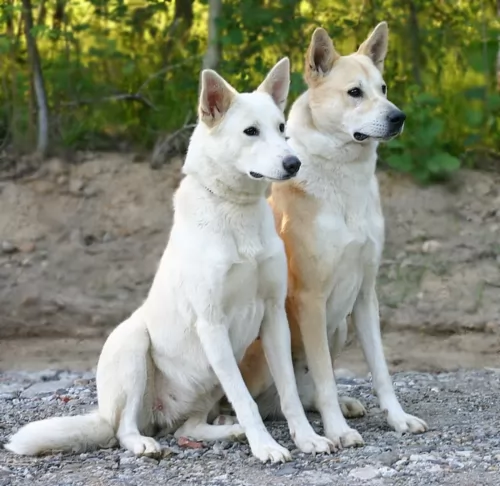 The Canaan Dog needs a steady diet of high-quality food, whether you provide your own home-made food or you buy commercially manufactured food. A healthy diet full of minerals and vitamins is essential for good health. If you’re not sure how to feed your Canaan dog, your veterinarian can advise you according to your dog’s age.
The Canaan Dog needs a steady diet of high-quality food, whether you provide your own home-made food or you buy commercially manufactured food. A healthy diet full of minerals and vitamins is essential for good health. If you’re not sure how to feed your Canaan dog, your veterinarian can advise you according to your dog’s age.
Remember that dogs are carnivorous so even though raw meat can be pretty expensive, you want to include it in his diet from time to time to stave off itchy, dry skin rashes and other illnesses. Always see to it that there is a bowl of fresh, cool water 24/7.
The Canaan Dog is a low maintenance breed who has moderate, seasonal shedding. The coat is easy to groom. He will need a good brush twice a week to keep him free of loose hairs and to keep his coat shiny.
Other kinds of grooming are also important such as brushing his teeth 2 or 3x a week to remove tartar build-up. Bad teeth can affect the immune system and make him ill.
Canaans are going to require a moderate amount of exercise. Just like with any dog, you can’t just buy a cute puppy and when he becomes an adult and no longer cute to you, forget about him in the backyard. A dog is a 15 year responsibility and he will need regular walks and games from you to guarantee his health and happiness.
 The puppy needs about 300 -400 calories per day in 3-4 servings per day
The puppy needs about 300 -400 calories per day in 3-4 servings per day
The adult dog needs about 250-350 calories a day to maintain good weight and health. Feed 2-3 times per day.
Strong, stamina
These dogs love exercise and definitely need it. They will get to be anxious or bored if they don’t get enough exercise. A back yard run is fine but remember that the Hokkaido is a jumper and make sure your fence is at least six feet high. They need daily walks even if you have a fenced yard. Martindale collars or harnesses are needed when walking them.
These dogs love games and competitive activities. They are good at hunting and guarding of course. There are other activities they can excel at and enjoy jogging, biking with you, and hiking. In competition they enjoy and are good at agility, flyball, lure coursing, rally, weight pull, dock diving, and obedience. They do not participate in confirmation.